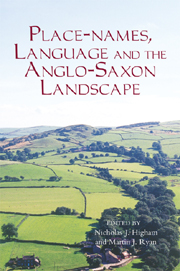Book contents
- Frontmatter
- Contents
- List of Illustrations
- Acknowledgements
- List of Contributors
- Abbreviations
- 1 Place-Names, Language and the Anglo-Saxon Landscape: An Introduction
- 2 The Landscape of Place-Name Studies
- 3 Place-Names as Travellers' Landmarks
- 4 Light thrown by Scandinavian Place-Names on the Anglo-Saxon Landscape
- 5 Language and the Anglo-Saxon Landscape: Towards an Archaeological Interpretation of Place-Names in Wiltshire
- 6 Hunting the Vikings in South Cumbria from Ambleside to Haverbrack
- 7 Viking-Age Amounderness: A Reconsideration
- 8 The Woodland Landscape of Early Medieval England
- 9 The Pre-Conquest Lands and Parish of Crediton Minster, Devon
- 10 Rewriting the Bounds: Pershore's Powick and Leigh
- 11 That ‘Dreary Old Question’: The Hide in Early Anglo-Saxon England
- 12 Boroughs and Socio-Political Reconstruction in Late Anglo-Saxon England
- Index
10 - Rewriting the Bounds: Pershore's Powick and Leigh
Published online by Cambridge University Press: 05 February 2013
- Frontmatter
- Contents
- List of Illustrations
- Acknowledgements
- List of Contributors
- Abbreviations
- 1 Place-Names, Language and the Anglo-Saxon Landscape: An Introduction
- 2 The Landscape of Place-Name Studies
- 3 Place-Names as Travellers' Landmarks
- 4 Light thrown by Scandinavian Place-Names on the Anglo-Saxon Landscape
- 5 Language and the Anglo-Saxon Landscape: Towards an Archaeological Interpretation of Place-Names in Wiltshire
- 6 Hunting the Vikings in South Cumbria from Ambleside to Haverbrack
- 7 Viking-Age Amounderness: A Reconsideration
- 8 The Woodland Landscape of Early Medieval England
- 9 The Pre-Conquest Lands and Parish of Crediton Minster, Devon
- 10 Rewriting the Bounds: Pershore's Powick and Leigh
- 11 That ‘Dreary Old Question’: The Hide in Early Anglo-Saxon England
- 12 Boroughs and Socio-Political Reconstruction in Late Anglo-Saxon England
- Index
Summary
The only surviving document from Anglo-Saxon Pershore is one of the more important charters that remain from pre-Conquest England. It records a grant of privileges and restoration of land ostensibly issued by King Edgar in favour of Pershore, and it is one of the so-called ‘Orthodoxorum’ group, a set of documents which has been the subject of much discussion among historians. It survives as an original (but perhaps not authentic) single sheet, as well as some later copies, and the single sheet includes no fewer than fifteen distinct boundary clauses, all of which are in Old English. Of the later copies, by far the most important is found in a paper manuscript compiled by John Joscelyn which contains early modern transcripts of texts with broadly historical content. This copy is so important because it contains a version of the text which is significantly different from the others, a point that has been noticed by almost no other scholars of this document to date.
The differences between the two versions are many and complex, but, to summarise briefly, each of the two main manuscripts preserves information not in the other. This information includes the list of estates which were granted to Pershore: the single-sheet copy lists forty-nine estates and Joscelyn's transcript gives fifty-nine; of these, forty-six appear in both lists, two only in the single sheet, and thirteen only in the transcript.
- Type
- Chapter
- Information
- Place-names, Language and the Anglo-Saxon Landscape , pp. 195 - 206Publisher: Boydell & BrewerPrint publication year: 2011



